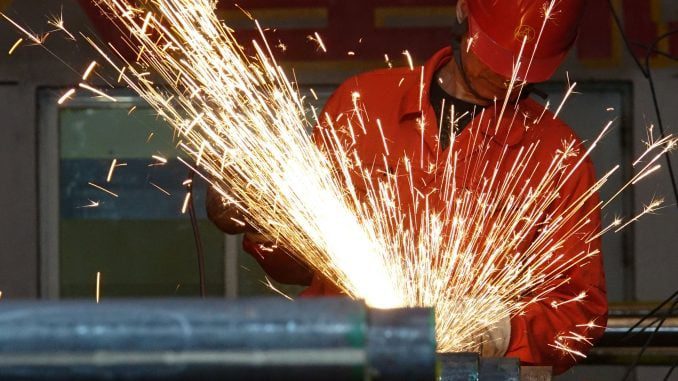
WASHINGTON, D.C. — The Federal Reserve is expected to keep interest rates unchanged this week, but solid economic growth combined with rising inflation lead analysts to say there could be another two hikes later this year.
The rate decision comes at 2 p.m. on Wednesday and follows news from the Commerce Department Friday that the U.S. economy grew at 4.1 percent in the second quarter, its fastest pace in nearly four years, as consumers boosted spending and farmers rushed shipments of soybeans to China to beat retaliatory trade tariffs.
Economic growth, and the 4.0 percent unemployment rate, has been aided by the Trump administration’s package of tax cuts and government spending, and Fed Chairman Jerome Powell has said overall the economy is in a “really good place.”
However, rate setters also remain wary of the potential effects of a protracted trade war between the United States and China which could push the cost of goods higher and hurt company investment plans.
The billions of dollars in tariffs by the White House have drawn fire and support from various Republicans. Most recently, billionaires Charles and David Koch, whose philanthropic activities have channeled billions of dollars into conservative causes and campaigns, came out against them.
The Kochs champion free trade and have launched a multimillion-dollar campaign to oppose Trump’s tariffs, which have targeted China, Canada, Mexico and the European Union, among others. North Carolina’s Bob Luddy attended Koch discussions on the economy in Colorado over the weekend.
“In all the people I talked to, they were steadfast against tariffs,” said Luddy. “They believed it would have an adverse effect on our gross domestic product and in the worst case, if it continues, could lead us toward recession.”
Luddy said his company, CaptiveAire, maker of commercial kitchen ventilation equipment, was notified by distributors this week that starting Aug. 1 a 25 percent tariff would be applied to their steel aluminum raw materials.
“In the simplest terms, countries and producers buy from the low-cost producer around the world,” he said. “So tariffs interfere with the normal purchasing and business flow and the relationships that have built up for many, many years. They also tend to cause inflations because tariffs cause manufacturers to raise prices, and that begins to move through the economy.”
Traditionally, Republicans have backed free trade, and some lawmakers have grumbled about Trump’s moves but have stopped short of taking any major action. Trump lashed out at the Kochs this week for their moves against the tariffs.
“Their network is highly overrated, I have beaten them at every turn,” Trump tweeted on Monday.
The Koch network largely ignored the criticism.
“We support policies that help all people improve their lives,” James Davis, a spokesman for the Koch network, said in a statement. “We look forward to working with anyone to do so.”
Trump has defended his trade policies, saying he backs free but “fair” trade to support U.S. workers.
“People buy into this ‘fair trade’ concept, but fair trade is anything anybody makes it out to be,” said Luddy. “It’s really a bunch of nonsense. We buy internationally because it’s best value. … If you look at the aggregate picture, America is strong and growing and has a great GDP because we are a mostly free international trader.”
Rep. David Rouzer (R-NC9) said Tuesday on WPTF that the strategy fits the president and ultimately could yield positive results.
“This is a gentleman that looks at the world through a very different lens than previous administrations,” said Rouzer. “If you consider his successes and where he lived there in New York, he was dealing with the mob every day and you’ve gotta be tough. On the playground if you get popped in the mouth and you don’t pop them back it’s going to continue. That’s basically his philosophy.”
Last week Trump announced at the White House an agreement with the president of the European Union where Trump agreed to ease tariffs on European cars and for Europe to buy more American soybeans while the two work toward zero tariffs.
“I think the president is getting the message, but he also has to manage all the statements he’s already made and the predicament we are already in,” said Luddy. “The consensus among some was that at some point he’ll do something similar to what he did with the EU and find a way to back out of this situation.”
Reuters News Service contributed to this report.



